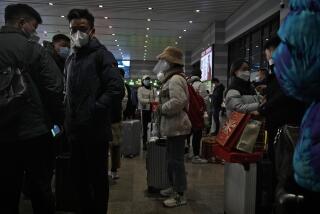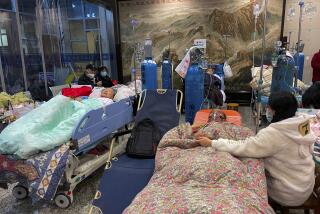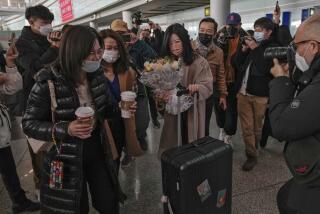Taiwan Is Added to SARS Travel Alert
- Share via
TAIPEI, Taiwan — The World Health Organization on Thursday extended its warning against unnecessary travel to Taiwan’s beleaguered capital, along with the mainland Chinese areas of Tianjin and Inner Mongolia as the SARS epidemic continued to inflict economic and social damage across Asia.
The new WHO warning expanded the alert beyond the advisories against travel to the Chinese areas of Beijing, Hong Kong, Guangdong province and Shanxi province, which have been the focus of the outbreak of the pneumonia-like disease.
The world death toll from the SARS epidemic reached 506 on Thursday, with 7,053 infections. Russia threatened to restrict travel to China as the country reported its first case of SARS, and North Korea, long isolated from the international community, sought $1.5 million from the Red Cross to help prevent incursions of the virus.
Compounding concerns about the outbreak, Cambodian officials reported the death of seven people from an unidentified form of pneumonia in two impoverished regions near the country’s border with Vietnam. WHO and Cambodian officials said there is no evidence to indicate the deaths are linked to SARS.
The worst news came from Taipei, where officials reported at least six new cases of SARS that could not be traced to foreign travel or to other SARS victims. Such instances of so-called community infection have been a harbinger of much larger outbreaks to come in other countries that have been affected by severe acute respiratory syndrome.
Taiwanese authorities were investigating the death of a 63-year-old man in the southern city of Kaohsiung, which would represent the first SARS case outside Taipei.
Taiwan has 132 probable SARS cases and 14 deaths. The island trails only mainland China and Hong Kong in the number of SARS cases.
“It is a grim situation at the moment,” said Dr. Lee Ming-liang, who was recently appointed to head a SARS task force. “Our most important task at this point is to track down the sources of community infections.”
The increases have been especially bitter for Taiwan, which has imposed some of the most draconian measures of any country in its efforts to control the disease.
Authorities require all passengers on trains and buses to wear masks, and visitors to buildings with more than 100 workers must have their temperatures taken before entering. The country is also imposing 10-day quarantines on all visitors from China, Hong Kong, Singapore and Toronto -- a step that is devastating to its economy.
Taiwan President Chen Shui-bian told the Cabinet on Thursday night that he would order the army and police to take a more active role in enforcing the quarantine and pursuing violators.
“No other country has imposed such restrictive measures, but it seems they are not very effective and people are frustrated,” said Andrew Yang of the Chinese Council of Advanced Policy Studies, a Taipei think tank.
The initial assessment of a WHO epidemiological team -- the first representatives of that agency to visit the island in 30 years -- did not provide any comfort, criticizing the country’s initial efforts at containment.
“There is some concern that they are not taking proper infection-control measures and that, when a case is identified, they do not have the procedures to make sure that person is isolated,” said Maria Cheng, a WHO spokeswoman.
China reported 146 new infections and five deaths Thursday, bringing the total there to 4,698 cases and 224 fatalities. Among the total was the first reported death in Shanghai, China’s largest city. The 68-year-old victim, surnamed Li, was the father of Shanghai’s first confirmed SARS case, who is still hospitalized. Shanghai officials said the city has six SARS cases.
To remedy mounting economic losses inflicted by the epidemic, China’s Cabinet decided to offer tax cuts and lower licensing fees to the hardest-hit industries, including aviation, restaurants, tourism and taxi companies. Beijing will reduce the rental fees taxi drivers pay to their companies by 50%.
The U.S. Agency for International Development said it would provide $500,000 to the country to help bolster its health-care system. The funds will be used to purchase protective gear and medical supplies, such as thermometers, goggles, gowns and masks.
WHO officials in China turned their attention to the country’s poorer provinces, dispatching four experts to Hebei province, which surrounds Beijing.
The team, which arrived in the city of Baoding, will inspect hospitals, talk to medical workers and visit rural areas.
In recent days, an estimated 1 million migrant workers have returned to Hebei from Beijing and others SARS-stricken areas. Eight officials in the Hebei city of Zhouzhou were fired for allowing a SARS-infected woman returning from Beijing to infect her family, state media reported.
The eight officials were a fraction of the 120 bureaucrats punished in the last month for covering up SARS cases or allowing the disease to spread.
China’s difficulties have engendered concern in countries sharing a border with it.
In Moscow, health officials said the country had its first SARS case, a man hospitalized in the border town of Biagoveshchensk, which has a booming cross-border trade.
Although the case has not yet been confirmed by laboratory tests, Russian aviation authorities ordered airlines to suspend reservations on flights to China, Hong Kong and Taiwan, and to be prepared to cancel all flights.
*
Demick reported from Taipei, Kuhn from Beijing and Maugh from Los Angeles.
More to Read
Sign up for Essential California
The most important California stories and recommendations in your inbox every morning.
You may occasionally receive promotional content from the Los Angeles Times.













